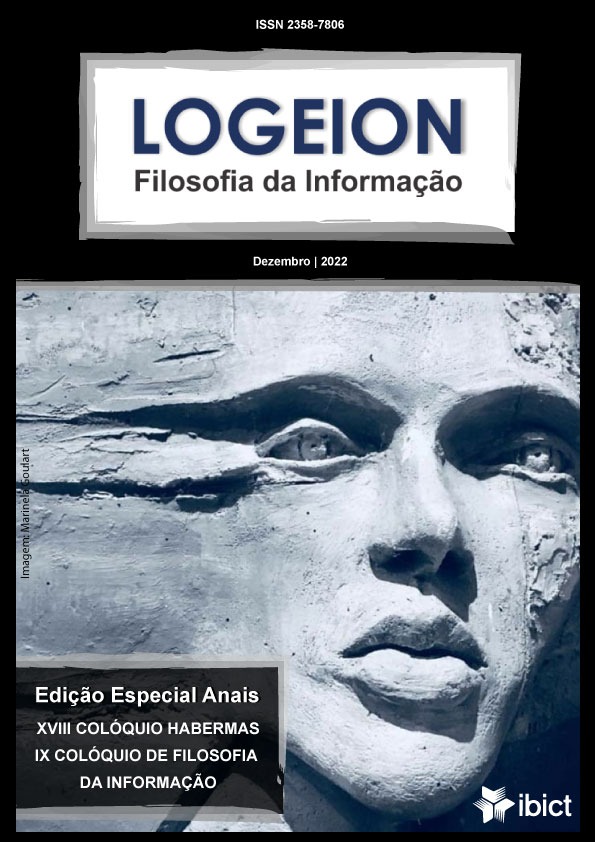Polyphone information regime
as a counterpoint to the notion of disinformation in information science
DOI:
https://doi.org/10.21728/logeion.2022v9nesp.p349-359Keywords:
Disinformation. Polyphonic information regime. Neoliberalism. Digital social networks.Abstract
The purpose of the present work is to discuss the use of the term disinformation by the field of Information Science (CI). The word, disinformation, has been used in recent years - most notably after the election of Donald Trump to the presidency of the United States of America, a position he held between the years 2016 to 2020 - to characterize a behavior based on the sharing of fake news via digital social networks, mostly, and, through communication techniques that aim to make users of a certain communication tool, believe in fake news. However, we believe that the use of the term cannot clearly explain how it occurs or, if possible, determine via studies in the field of IS (information as a physical dimension, information as a cognitive dimension, information as a social intersubjective dimension) that there is a phenomenon or a process that misinforms subjects exposed to certain information. We believe that there is a contradiction in the term, which can contribute to an explanatory tabula rasa on how the validation of certain information content is processed, that is, under which ethical foundations, regulatory frameworks and customary practices the subjects in this digital arena produce, appropriate and disseminate information.
Downloads
References
ARAÚJO, Carlos Alberto Ávila. O conceito de informação na Ciência da informação. Informação & Sociedade, v. 20, n. 3, 2010. Disponível em: https://www.academia.edu/4342492/O_conceito_de_informa%C3%A7%C3%A3o_na_ci%C3%AAncia_da_informa%C3%A7%C3%A3o. Acesso em: 02 ago. 2022.
BAKHTIN, Mikhail. Estética da criação verbal. 4. ed. São Paulo: Martins Fontes, 2003.
BAKHTIN, Mikhail Mikhailovich. Marxismo e filosofia da linguagem. 12. ed. São Paulo: Hucitec, 2006.
BAKHTIN, Mikhail Mikhailovich. Problemas da poética de Dostoiévski. 5. ed. Rio de Janeiro: Forense Universitária, 2010.
BEZERRA, A. C.; SCHNEIDER, M.; CAPURRO, R. O arco teleológico da ética da desinformação: dos pomadistas de Machado de Assis aos negacionistas da pandemia. Revista Eletrônica de Comunicação, Informação & Inovação em Saúde, [S. l.], v. 16, n. 2, 2022. DOI: 10.29397/reciis.v16i2.3270. Disponível em: https://www.reciis.icict.fiocruz.br/index. php/reciis/article/view/3250. Acesso em: 23 jun. 2022.
BOTTOMORE, T. Dicionário do pensamento marxista. Rio de Janeiro: Jorge Zahar, 2001.
DE GÓMEZ, Maria Nélida González. Regime de informação: construção de um conceito. Informação & Sociedade, v. 22, n. 3, 2012. Disponível em https://www.brapci.inf.br/_repositorio/2015/12/pdf_3c42553162_0000011948 acesso em 02 ago. 2022.
HABERMAS, Jürgen. Consciência moral e agir comunicativo. Rio de Janeiro: Tempo Brasileiro, 1989.
HELLER, B.; JACOBI, G.; LIMA, J. B. Por uma compreensão da desinformação sob a perspectiva da ciência da informação. Ciência da Informação, v. 49, 2020. Disponível em: http://hdl.handle.net/20.500.11959/brapci/149761. Acesso em: 23 jun. 2022.
HJØRLAND, B.; ALBRECHTSEN, H. Toward a new horizon in information science: domain-analysis. Journal of the American Society for Information Science, v. 46, n. 6, p.400-425, 1995.
LYNCH, Christian; CASSIMIRO, Paulo Henrique. O populismo reacionário: ascensão e legado do bolsonarismo. Editora Contracorrente, 2022.
MOURA, A. R. P.; FURTADO, R. L.; BELLUZZO, R. C. B. Desinformação e competência em informação: discussões e possibilidades na arquivologia. Ciência da Informação em Revista, v. 6, n. 1, p. 37-57, 2019. DOI: 10.28998/cirev.2019v6n1c. Acesso em: 23 jun. 2022.
POPPER, Karl R. Conhecimento objetivo: uma abordagem evolucionária. Belo Horizonte: Itatiaia Limitada, 1975.
RADAMÉS LINARES, C. Ciencia de laInformación: suhistoria y epistemología. Bogotá, Colombia: Editorial Rojas Eberhard, 2005.
SHANNON, Claude; WEAVER, Warren. Teoria matemática da comunicação. São Paulo: Difel, 1975.
SOUZA, Jessé. A elite do atraso: da escravidão à lava jato. Rio de Janeiro: Leya, 2017.
Downloads
Published
Issue
Section
License
Copyright (c) 2023 Logeion: Filosofia da Informação

This work is licensed under a Creative Commons Attribution-NonCommercial-ShareAlike 4.0 International License.
The journal is published under the Creative Commons - Attribution - Noncommercial - Share Alike 3.0 Brazil.
The published work is considered collaboration and therefore the author will not receive any remuneration for this as well as anything will be charged in exchange for publication.
All texts are responsibility of the authors.
It’s allowed partial or total reproduction of the texts of the magazine since the source is cited.




